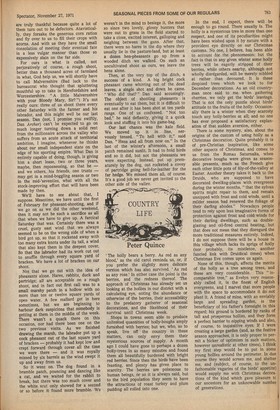COUNTRY . LIFE Peter Quince
' The holly bears a berry. As red as any blood,' as the old carol reminds us, or, if you prefer the slightly more delicate version which has also survived. As red as any rose.' In either case the point is the berries, and the redness thereof. The approach of Christmas has already set us looking at the hollies in our district with a calculating eye, noting the abundance or otherwise of the berries, their accessibility to the predatory gatherer of seasonal decorations, and the likelihood of their survival until Christmas week.
Shops in towns seem able to produce unlimited quantities of holly-boughs amply furnished with berries; but we, who, so to speak, live off the country in these matters, can only envy them their mysterious sources of supply. A month ago I could have gone to perhaps a dozen holly-trees in as many minutes and found them all beautifully burdened with bright red berries. Since then the birds have been feasting, and plenty has given place to scarcity. The berries are poisonous to human beings, or so it is always said, but to the bird population they seem to have the attractions of roast turkey and plum pudding all rolled into one. In the end, I expect, there will be enough to go round. There usually is. The holly is a mysterious tree in more than one respect, and one of its peculiarities might have been wished upon it by nature with a provident eye directly on our Christmas customs. No one, I believe, has been able to account for the phenomenon: but the fact is that in any given winter some holly trees will be eagerly stripped of• their berries, while others nearby, although not wholly disrdgarded, will be merely nibbled at rather than devoured. It is these despised trees which we look to for December decorations. As an old countryman once said to me when gathering cherries, we only get the birds' leavings. That is not the only puzzle about birds' attitude to the fruits of the holly. Occasionally there is a winter when they scarcely touch any holly-berries at all; and no one has ever proposed a satisfactory explanation of that sudden aversion, either.
There is some mystery, also, about the origins of the custom of using holly as a Christmas decoration. Quite probably it is of pre-Christian inspiration, like some other aspects of Christmas, and comes to us from the Roman Saturnalia, when decorative boughs were given as seasonable presents, much as the French give each other little pots of lily-of-the-valley at Easter. Another theory takes it back to the Druids, who are supposed to have decorated dwelling-places with evergreens during the winter months, "that the sylvan spirits might repair to them, and remain unnipped with frost and cold winds, until a milder season had renewed the foliage of their darling abodes." Nowadays people tend to rely upon less imaginative forms of protection against frost and cold winds for their darling dwellings, such as doubleglazing and oil-fired central 'heating, but that does not mean that they disregard the more traditional measures entirely. Indeed, I do not suppose there will be a house in this village which lacks its sprigs of holly (nor probably, its mistletoe, another fancied link with Druidical times) when Christmas Eve comes upon us again.
None of this, though, affects the merits of the holly as a tree among trees, and these are very considerable. This "incomparable tree," as Evelyn very reasonably called it, is the finest of English evergreens, and I marvel that more people with the space to accommodate it do not plant it. A friend of mine, with an enviably large and spreading garden, is the beneficiary of his father's foresight in this regard; his ground is bordered by ranks of tall and prosperous hollies, and they form a perfect barrier to nipping winds and also, of course, to inquisitive eyes. If I were creating a large garden (and, as the festive season approaches, it is only proper to permit a bicker of optimism in such matters, however unrealistic at other times), I think my first step would be to put in some young hollies around the perimeter. In due course they would screen me, and shelter me, and (subject, of course, to the unfathomable vagaries of the birds' appetite) would supply me with Christmas decorations of the kind which gave pleasure tc our ancestors for an unknowable numbel of generations.














































 Previous page
Previous page